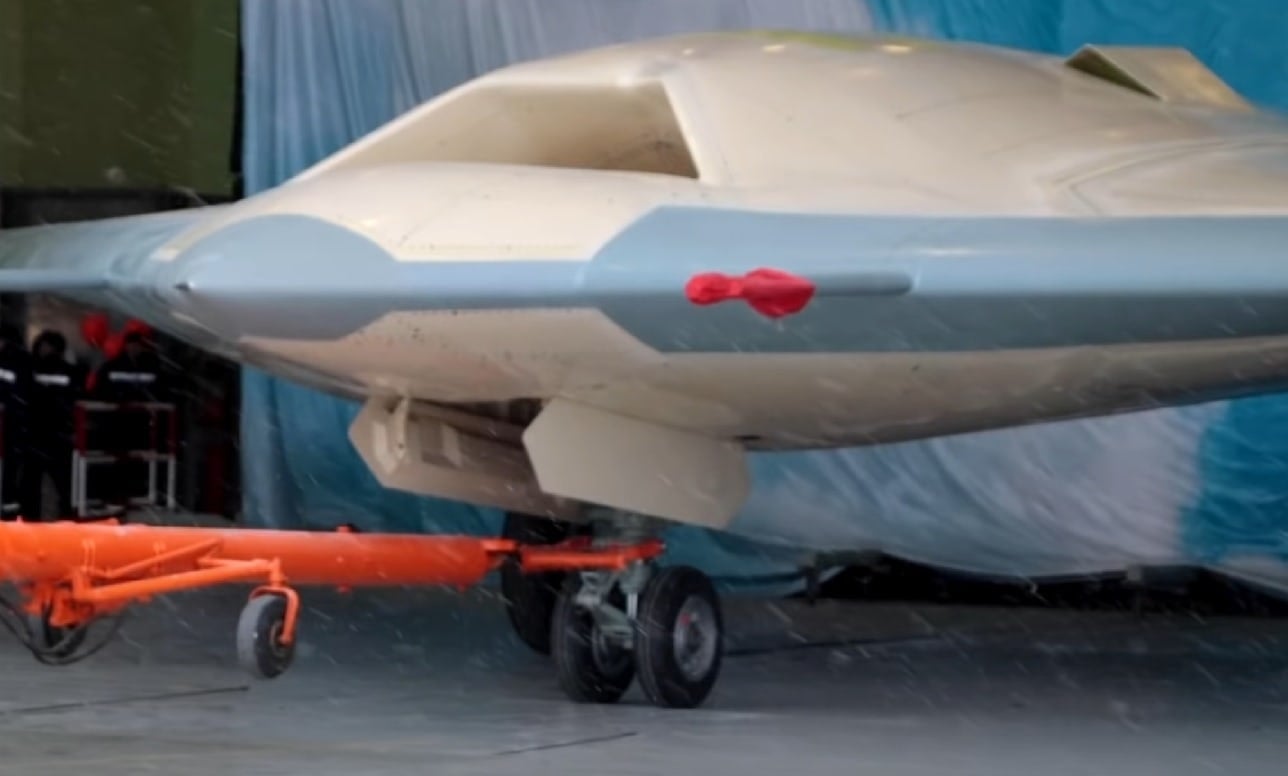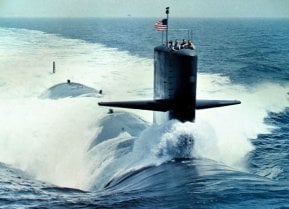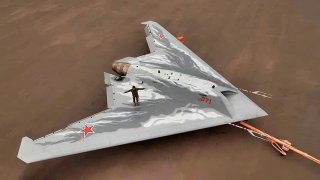Russia Shoots Down Its Own S-70 Stealth Drone in Ukraine for Fear of Capture
In a recent display of military ineptitude, Russia was forced to shoot down its own S-70 Okhotnik stealth drone after losing control of the unmanned aircraft.
What You Need to Know: In a recent display of military ineptitude, Russia was forced to shoot down its own S-70 Okhotnik stealth drone after losing control of the unmanned aircraft.

-According to British Military Intelligence, the incident occurred on October 5, 2024, when the drone flew uncontrollably over the Ukraine front lines.
-The S-70, touted for its advanced stealth capabilities, was shot down to prevent it from falling into enemy hands.
-This incident highlights another failure in Russia’s defense technology, following a series of setbacks in the Ukraine conflict. It is expected to delay the development of the S-70 program further.
Russian Military’s S-70 Stealth Drone Destroyed by Own Forces Over Ukraine
After almost three years of intense fighting, one thing emerges clear: there is a high level of ineptitude in the ranks of the Russian military.
In the latest example of this ineptitude, the Russian military was forced to shoot down an S-70 Okhotnik, one of its most advanced stealth drones, after it lost control.
Shooting Down Your Own Aircraft
Last week, the Russian military lost one of its most advanced unmanned aerial vehicles.
“On October 5, 2024, Russia shot down their own S-70 Okhotnik "Hunter" uncrewed combat aerial vehicle (UCAV) as it flew west over the front lines of the Ukraine conflict,” the British Military Intelligence assessed in its latest estimate of the war.
“It is likely that Russia lost control of the UCAV and took the decision to destroy the aircraft to avoid it falling into adversary hands,” claimed the British Military Intelligence.
Unmanned aerial vehicles (UAVs) are vulnerable to electronic warfare. One way to neutralize enemy drones is to take over their controls through electronic warfare means and either force them to land wherever you prefer or even turn them against their original users.
The war in Ukraine has seen the unprecedented use of drones. Both sides are using unmanned aerial systems in a variety of roles, including artillery support, intelligence, surveillance, and reconnaissance (ISR), and kinetic strikes.

The Russian military has been using both domestically-made drones and imported ones. Moscow has an agreement with Iran and has received thousands of suicide drones, including the quite effective Shahid series of unmanned aerial vehicles.
“A Sukhoi enterprise, the S-70 has been in development for at least a decade, having been observed testing at Russia’s Akhtubinsk airbase. A key attribute of the S-70 is its reduced radar cross section which is intended to make it a stealth deep-strike asset, capable of penetrating adversary radar and air-defense coverage. The system is purported to be able to operate jointly with the Su-57 Felon fighter,” the British Military Intelligence stated.
The Russian defense and aerospace industry has been making some suspicious claims concerning the stealth capabilities of its products. Take for example the Su-57 Felon fighter jet that is supposed to have stealth characteristics similar to those found on the U.S. F-22 Raptor and F-35 Lightning II stealth fighter jets.
Despite the Russian claims, the very small fleet of Su-57 Felon aircraft has played an almost nonexistent role in the fighting in Ukraine. The Russian Aerospace Forces clearly understand that their stealth aircraft are nothing but and don’t want to create further embarrassing incidents by losing them to Ukraine’s Western air defenses.
“Russia likely waited to the last moment before choosing to engage the UCAV having exhausted attempts to bring it back under control,” the British Military Intelligence added.
“This demonstrates yet another expensive and embarrassing failure of Russian weapons development and will almost certainly delay the S-70 program,” the British Military Intelligence concluded.
About the Author:
Stavros Atlamazoglou is a seasoned defense journalist specializing in special operations and a Hellenic Army veteran (national service with the 575th Marine Battalion and Army HQ). He holds a BA from the Johns Hopkins University and an MA from the Johns Hopkins’ School of Advanced International Studies (SAIS). His work has been featured in Business Insider, Sandboxx, and SOFREP.
Image Credit: Creative Commons and/or Shutterstock.


